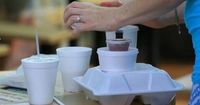Starting from October 2025, Hanoi is set to pilot a groundbreaking initiative to eliminate the use of single-use plastics in restaurants, cafes, and beverage shops within the city's Ring Road 1 area. This move, mandated by Directive 20 issued on July 12, 2025, by Prime Minister Pham Minh Chinh, marks a decisive step toward combating the city’s severe environmental pollution challenges.
Hanoi faces a daunting environmental reality, with more than 1,400 tons of plastic waste generated daily. Air pollution levels at certain times of the year rank among the highest globally, while water quality in inner-city rivers has consistently exceeded safe limits for years. Recognizing these urgent concerns, the Prime Minister has called for a multi-faceted approach to environmental protection that includes reducing plastic waste, improving air quality, and enhancing urban waste management.
The pilot program will initially focus on restaurants, hotels, beverage shops, and eateries within Ring Road 1, where single-use plastic items such as cups, straws, food trays, and packaging will no longer be used. This initiative will begin in the fourth quarter of 2025 and is planned to expand citywide in the following years. The Hanoi City People’s Council reinforced this commitment by approving a resolution on July 11, 2025, targeting reductions in plastic emissions across production, business, services, and daily life.
Specifically, from January 1, 2026, hotels and tourist areas in Hanoi will be prohibited from using single-use plastic products like toothbrushes, razors, cotton swabs, shower caps, and small sachets containing toothpaste, shampoo, or body wash. The following year, starting January 1, 2027, markets and convenience stores will be banned from providing free difficult-to-biodegrade nylon bags. By January 1, 2028, these outlets will no longer be allowed to circulate or use single-use plastics, nylon bags, or hard-to-degrade plastic packaging. Online sellers will also bear responsibility to minimize plastic packaging and ensure collection of plastic materials to prevent environmental leakage.
Looking further ahead, Hanoi plans to cease all production and import of single-use plastic products, difficult-to-biodegrade plastic packaging, and goods containing microplastics by January 1, 2031. Exceptions will exist only for exports or specific consumer product packaging. These policies align with Decree 08 of 2022, which defines single-use plastic products as items like food trays, bowls, cups, and straws designed for one-time use, and categorizes difficult-to-biodegrade plastics as those made from PE, PP, PS, PVC, and PET, known for their slow decomposition in soil, water, or landfills.
Hanoi’s ambitious plan is part of a broader national movement. Other provinces and cities have already taken pioneering steps to reduce plastic pollution. For instance, Cu Lao Cham Island in Da Nang banned tourists from bringing nylon bags as early as 2019, followed by Co To in Quang Ninh in 2022. Ha Long Bay also prohibited single-use plastic items like cups, straws, and nylon bags for visitors six years ago. In May 2025, a cruise ship was suspended for seven days after allowing passengers to use single-use plastics, illustrating the strict enforcement of these policies.
Meanwhile, Ho Chi Minh City targets limiting nylon bag and single-use plastic usage in Thach An commune and Can Gio tourist spots by 2030. Da Nang piloted plastic reduction measures in local markets three years ago, encouraging merchants to use paper bags and recycle clean nylon bags. Across the country, commercial centers, supermarkets, hotels, and tourist areas will stop using single-use plastics and hard-to-degrade packaging after 2025. Production and import of small-sized difficult-to-biodegrade nylon bags will be phased down starting January 1, 2026, with a nationwide halt on single-use plastics expected after 2030.
In addition to plastic reduction, the Prime Minister’s Directive 20 also emphasizes tackling broader environmental pollution in Hanoi. The Ministry of Construction is tasked with accelerating the development of public transportation to reduce reliance on personal vehicles, which contribute significantly to air pollution. This includes promoting environmentally friendly transport options and strengthening emission controls through updated national technical standards for motor vehicles.
Hanoi is also directed to study increasing fees related to vehicle registration, license plates, and parking in central urban areas, particularly targeting vehicles powered by fossil fuels. This measure aims to discourage the growth of private motorized transport and reduce pollution. A clear roadmap for these fee adjustments is to be developed starting in the third quarter of 2025, with annual revisions thereafter.
Waste management is another critical focus. The government calls for projects to address pollution in urban waterways—rivers, canals, and ditches—within Hanoi’s inner city. It also mandates comprehensive plans for collecting and treating wastewater and household waste, ensuring pollution is addressed at its source rather than shifted elsewhere. Polluting production facilities will be relocated to industrial zones by 2028, and urban areas lacking centralized wastewater treatment will face strict penalties.
To support these efforts, the Prime Minister highlights the importance of mobilizing public and private investment, combining budget resources with social funding. Special incentives will encourage recycling and waste-to-energy initiatives using the latest technologies. The formation of recycling industrial zones and waste treatment plants within Hanoi is prioritized to reduce landfill dependency and prevent environmental degradation and urban blight.
Hanoi’s multi-pronged approach reflects a deep commitment to sustainable urban development and environmental stewardship. By targeting single-use plastics, improving transport infrastructure, enforcing stricter pollution controls, and innovating waste management, the city aims to reverse its environmental decline and set a model for other urban centers in Vietnam and beyond.
As Hanoi embarks on this ambitious journey, the success of these initiatives will depend on cooperation from businesses, residents, and government agencies alike. The pilot program banning single-use plastics in eateries within Ring Road 1 is just the beginning, signaling a future where cleaner streets, purer air, and healthier waterways become the new normal.




